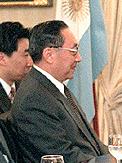Li Lanqing facts for kids
Quick facts for kids
Li Lanqing
|
|
|---|---|
|
李岚清
|
|

Li Lanqing in 1997
|
|
| Vice Premier of China | |
| In office 17 March 1998 – 6 March 2003 |
|
| Premier | Zhu Rongji |
| Minister of Foreign Economic Relations and Trade | |
| In office 1990–1993 |
|
| Preceded by | Zheng Tuobin |
| Succeeded by | Wu Yi |
| Personal details | |
| Born | 22 May 1932 Zhenjiang, Jiangsu, Republic of China |
| Political party | Chinese Communist Party |
| Alma mater | Fudan University |
Li Lanqing (simplified Chinese: 李岚清; traditional Chinese: 李嵐清; pinyin: Lǐ Lánqīng) was born on May 22, 1932. He is a retired Chinese politician. He served as a very important leader in China's government. From 1998 to 2003, he was the first-ranked Vice Premier of China. This means he was one of the top leaders helping the Premier run the country.
He was also a member of the Politburo Standing Committee. This is a small group of the most powerful people in the Chinese Communist Party (CCP). He was part of this group from 1997 to 2002. Before that, he was a regular member of the Politburo from 1992 to 1997.
Contents
Li Lanqing's Early Life and Education
Li Lanqing was born in Zhenjiang, a city in Jiangsu province, China. He started his career working at a car factory called First Automobile Works.
He went to Fudan University in Shanghai. He studied Business Management and graduated in 1952. In 1956, he traveled to the Soviet Union to learn more. There, he worked as a trainee in two car factories in Moscow.
Working for the Government
After returning to China, Li Lanqing started working for the government. In 1959, he became a secretary at the First Ministry of Machine Building. Later, in 1962, he worked as a secretary at the National Economics Commission.
During a period called the Cultural Revolution, he was sent to work in the countryside. This was a common experience for many officials at that time. In 1972, he went back to working in the automobile industry at Dongfeng Motor Corporation. He also helped plan a "Third Automobile Works" in 1978.
A Leader in China's Economy and Education
In 1981, China began to make big changes to its economy. These changes were called the Chinese economic reform. Li Lanqing was sent to Beijing to work for the central government. He led an office that managed money borrowed from other countries.
In 1983, he moved to Tianjin city. He worked as a vice mayor, helping the mayor Li Ruihuan. He also held important jobs in other government departments. These included the Ministry of Machine Building Industry and the State Economic Commission. He also directed the Foreign Investment Administration. This office helped manage money coming into China from other countries. He later became the Minister of Foreign Economic Relations and Trade.
From 1997 to 2002, Li Lanqing was part of the CCP Politburo Standing Committee. This was the highest level of power in Chinese politics. As Vice Premier, he was sometimes called the "Executive Vice Premier." He was in charge of national education policy. This meant he helped decide how schools and universities in China would work.
Li Lanqing also wrote a book called "Education for 1.3 Billion: On 10 Years of Education Reform and Development." This book was very popular in China. It has also been translated into English.
Life After Retirement
After he retired from his government roles, Li Lanqing found new hobbies. He started practicing calligraphy, which is the art of beautiful writing.
He also had a funny experience trying to get a job. He tried to become a shopkeeper at a local convenience store. But he was recognized by the owner and was not hired. This shows he was still well-known even after retirement.
In 2022, at the age of 90, he attended the 20th National Congress of the Chinese Communist Party. This is a very important meeting for the Chinese Communist Party.
See also
 In Spanish: Li Lanqing para niños
In Spanish: Li Lanqing para niños

